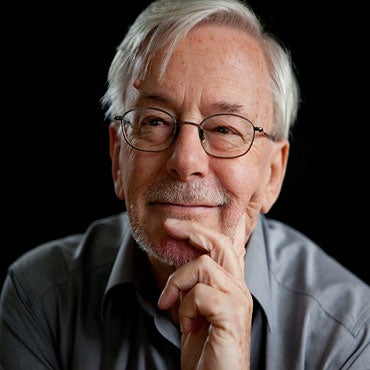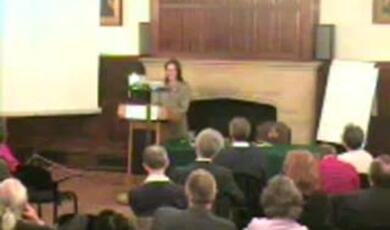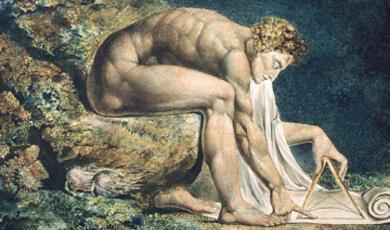The Limits of Science
Share
- Details
- Text
- Audio
- Downloads
- Extra Reading
Are there any limits to scientific explanation? Are there irreducibly different forms of explanation?
Download Text
THE LIMITS OF SCIENCE
Professor Keith Ward
Modern science begins with the ejection of purpose, value and significance from the universe. This is one main reason why the ‘scientific world-view’ fails to deal with all aspects of reality. The ‘disenchantment of nature’, the stripping away of all personal properties from the mechanisms of nature, was important to the birth of modern science. Aristotelian science included final causality as one of the explanatory features of nature. All things have an ideal end at which they aim, even if the ideal of being a tiger is only to be a good member of the tiger species. But the search for final causes proved fruitless, and experimental science only flourished when it excluded such a search, and instead sought for laws of relationship without purpose between objects.
The exclusion of the personal from nature is a methodological axiom of science – at least until the advent of quantum theory. With it goes the exclusion of any consideration of value in nature. For the idea of value is essentially connected with the idea of personal reality – a ‘value’ is something that is valued by some conscious personal being, whether God or some finite being. And such a distinctively personal reality came to be called in question when it was held that all knowledge was to be justified only by observation and experiment.
THE LIMITS OF OBSERVATION
When it is said that data are observable, it is meant that they are publicly observable – anyone in the right conditions can observe them, whatever their emotional state or character. When it is said that they are testable by experiment, it is meant that such observations can be repeated in experimental situations, in a predictable way. What enables you to make such predictions is the fact that sequences of events fall under precise laws of nature. For instance, the law of gravity tells you that two bodies will attract one another proportionally to the product of their masses and inversely proportionally to the square of the distance between them. For this to be so, you have to be able to measure mass, position, distance and velocity exactly. If you do, you can then predict exactly how the bodies will behave, relative to one another (if no other force intervenes). This prediction can be confirmed repeatedly by duplicating the initial situation, and everyone can see it for themselves. That is one ideal model of a scientific explanation.
But does this show us what reality is? It shows that close observation and exact measurement reveal that physical objects interact in regular, predictable ways, ways that we can capture quite neatly in the form of a few relatively simple general laws. This is quite astonishing, and very few people before the sixteenth century would have thought it was true. Isaac Newton’s formulation of the laws of mechanics did indeed introduce a new way of looking at the physical universe, as a law-governed set of objects and properties in space-time.
So there is little question that the laws of science do show us many important things about reality. This is not a universe in which many spirits or gods, good and bad, battle for the souls of human beings, causing disease, plague or odd moments of good fortune. It is not a universe in which a benevolent God is always doing whatever is best, or in which human acts always receive their just deserts. Here again scientific findings undermine any view that the way things go is always directly willed by some god or spirit. This is a universe in which material objects interact in accordance with general laws that seem indifferent to particular moral or immoral acts, and to the desires of capricious spirits and demons. For experimental science, it does not seem that the universe is morally ordered in particular ways. Its laws rule over good and bad alike, and cause events to occur without apparent reference to the beneficial or harmful effects they have on human or other sentient beings.
CRITERIA OF TRUTH
That is an important discovery, but it does not answer the question, ‘And is that what reality is?’ For if that is what reality is, you have to believe that the observational sciences give us the only access to truth. You have to believe that the only good reason for believing something is that you have observational, experimental evidence for it. But once you put it like that, it is obvious that such a hypothesis is self-refuting. The belief that you should only believe things on the basis of observation and experiment is not itself based on observation and experiment, and therefore it should not be believed. This is as near to a wholly self-refuting statement as anyone could desire. You are saying, ‘Only accept as true what can be observationally established’. But no observations show that statement is true. So it seems that you should not accept it after all (though you might accept it as a recommendation, which you are free to reject if you can think of some other way of establishing truths).
I think what lies behind this recommendation is the thought that to accept only what the sciences can establish is the most reasonable or economical course, and it works, producing useful, fruitful knowledge. If so, we are accepting the more general principle that rationality and fruitfulness are basic tests for truth, and what we shall then look for is the most reasonable and fruitful account of the nature of reality. Part of a reasonable account is that it should cover all the different sorts of data there are in as coherent a way as possible. And part of a fruitful account is that it should be helpful in maintaining a morally admirable, socially helpful, and personally integrating way of life. Of course, any such account must be consistent with the best scientific findings. But can we be quite sure that only scientific procedures are rational and fruitful? Might there not be other data, not accessible by the methods of the natural sciences, with which our account of reality needs to be consistent as well?
DREAMS
It is not hard to think of data, perfectly familiar to all of us, which are not covered by a strictly scientific account of reality. One typical example is that of dreams. Dreams do exist, for virtually everyone has them. If I frame the sentence, ‘There are dreams’ (if I quantify over dreams, to use the technical jargon) it makes perfectly good sense. There is observational evidence that nearly everyone dreams. In psychological tests in Edinburgh University, people are woken up when they display rapid eye movement, and asked if they are dreaming. They always say ‘yes’, even though, if not woken up, when they wake up naturally much later they may deny that they dreamed at all. So there is experimental evidence that we all dream, though we usually forget our dreams.
If you do forget them, there is no way in which anyone else can know what you were dreaming about. Moreover, if you do say your dreamed about something, there is no way in which anyone else can check whether what you say is true or not. Your dreams are not publicly observable or repeatable. They do not follow any laws of nature and they are not predictable, using such laws. But surely you did dream something; there was something there (wherever ‘there’ is, in the case of dreams).
Now if I accept the recommendation, ‘Only accept as true what can be observationally established’, I would never believe what you told me about your dreams. You observed your dream, no doubt. But I have to just trust you as to what the dream was about. I have no access to it. Even your own observation cannot establish that what you say is true, because you only have your memory to rely on, and we know how unreliable that is.
There is an easy escape from this dilemma. We can just say that we accept many reports of personal experience (like dreams) as true, because we trust the person who has such experiences, not because we can measure them or put them under general laws or repeat them or observe them. Here, it seems, is an entirely natural case where we accept that something is probably true, even though it is beyond the reach of scientific method. Dreams are not physical objects in space, so observational science cannot get a grip on them.
THE REALITY OF PERSONAL EXPERIENCE
It could be argued that one day dreams will be correlated with brain-states, and we will then be able to explain them scientifically, by examining the dreaming brain, and knowing what the brain is thinking of because we have a sort of dictionary that tells us what images various brain-states correlate with.
But how would we set up a dictionary for correlating brain-states with the thoughts and images that occur in dreams? We would have to ask the dreamer what he or she was experiencing when the brain was in a specific state. Having done that, it might just be possible to tell what the dreamer was experiencing by some sort of brain-scanning (as long as there were no dreams that had never been dreamed before, for which our dictionary would have no entries). But to get the information in the first place, or to confirm that our guesses were correct on any subsequent occasion, we would just have to ask, and trust the answer. Whatever the neurological sciences may establish about dreams, it is impossible to escape the conclusion that at some stage we have to accept data that are not given by public observation. We can then try to incorporate them into a scientific theory, but the point is made. Public observation, with which the natural sciences deal, is not the only means of access to truth-claims about reality. There are forms of human knowledge and experience that fall outside the reach of observational science.
There are reasons (perhaps drawn from science itself) to think that there are forms of reality with which observational science cannot deal. As well as dreams, there are also mental images of all sorts, thoughts that we never tell anyone about, and all sorts of pains, itches and feelings that we may keep to ourselves. I am more certain I experience such things than I am of any philosophical theory that tells me they do not exist.
THE UNIQUENESS OF EXPERIENCE
It is not just a matter of itches, dreams and feelings. Even when I observe the public world, my particular way of observing it is unique and virtually inexpressible. Think of hearing a particular chord in the middle of a Beethoven symphony. The playing of the chord is a public event, and the orchestra is publicly observable. But when I hear the chord, I do so in the light of (I should say ‘in the sound of’, but there is no such expression in English) the music that has gone before. Perhaps it is the resolution of a discord, or the completion of a melody. Perhaps I am hearing the piece for the first time, and so cannot quite make sense of it. Or maybe the piece is very familiar, and I am comparing it with previous performances, as to timbre, speed and resonance. I will also be anticipating what comes next, and that too will depend on how well I know the piece, and on how I think it might be interpreted.
Involved in this apparently simple experience of hearing a musical chord are my own musical skills, my memories, anticipations and emotional reactions. All these intertwine in a complex way, so that even that momentary experience is quite unlike the experience of anyone else who is hearing the same chord at the same time. I could not put it into words, but it may be a very important event in my life, of great intensity and significance – or it may not. Nobody will know but me – unless I tell them, very imperfectly and clumsily. And even then, perhaps nobody will know quite what it is like for me to have that experience.
Such experiences include some of the most important things in any human life. Standing before the Grand Canyon at sunset, catching a glimpse of someone you love, being suddenly transfixed by the beauty of a Rembrandt portrait, or catching a wave at Big Sur – these can be the most vivid and meaningful events in a human life. To deny their existence is absurd, and to dismiss them as nothing more than a series of electro-chemical events in the brain is to prefer a highly speculative and unconfirmed theory to the testimony of direct experience.
All such personal experiences are beyond the reach of the natural sciences. There are no measurable quantities, no general laws, no equations to capture their quality and intensity. They do have quality and intensity – they are pleasant or painful, weak or strong. This very fact shows that they are real, not imaginary. But there is no precise scale against which they can be measured. We might identify a part of the brain that is active when we feel pleasure, measure the intensity of electrical discharge and correlate it with our feelings of emotional strength. But this can only be done in a crude and general way. For if we cannot even properly describe our experience of hearing a symphony, what exactly are we correlating with brain-activity? It could only be experiences that we can describe in a very inadequate way, except to say that they are generally pleasant, intense, moving or exhilarating. Human experiences are intrinsically fuzzy, opaque to description, and hugely complex. They do not break down into atomic units that obey a few simple laws of interaction. They are essentially interconnected - present connects with past and future in ways that have never before existed, and that will never be repeated exactly, ever again.
THE ABSTRACTIONS OF SCIENTIFIC THEORY
The situation is quite different with the physical world as it is described by science. In atomic theory, for example, every particle of the same sort (e.g. an electron) is identical to every other. The laws that govern their interactions are simple and universal. Scientists explain events by reducing their components to simple elements, and bringing them under general laws. But if I have a new thought, it is unlike any other thought that has ever existed (if it is really new, which is perhaps rather rare, though it must happen). It does not arise by the application of any repeatable law. I cannot find any atomic constituents of thought that are all identical, or any general laws that can produce original ideas.
It is the uniqueness and interconnectedness of experiences that make scientific methods inappropriate to dealing with them. We can speak of intense, long-lasting, pleasant experiences; we can devise methods likely to produce certain sorts of experience, and we can sort experiences out into general categories in a slightly vague way. So there can be no serious doubt that experiences exist, and have quality, intensity and duration. But they do not have the repeatability, discreteness and denumerability of physical objects.
This helps to bring out, by contrast, how fortunate we are that the world of physical objects is not like that. For most of human history, people did not realise that physical objects are reducible to identical sorts of constituents that are exactly measurable and obey more or less universal and relatively simple laws. The possibility of science, in other words, is not at all obvious or necessary. There might have been a physical world in which, like the world of experiences, every object is unique and not precisely measurable, and changes in accordance with principles that are only general tendencies and patterns, rather than exact laws.
Having said that, the suspicion may arise that maybe the physical world is really like that, after all. Quantum theory suggests that it may be much more like that than classical physicists imagined. Could it be that the scientific world-view, perhaps the greatest change there has ever been in human understanding, works precisely because it abstracts from the unique particularity of events, artificially isolates elements that are intrinsically interconnected, and imposes a grid of rigid laws onto a physical reality that is in fact more plastic and flexible?
I think that is probably the case. Nonetheless, the physical world is publicly observable, measurable and subject to general law to a sufficient extent that modern science is possible – whereas this is not true of personal experiences.
There are personal experiences, known to all of us in a direct and natural way, that do not fall within the domain of the natural sciences. The scientific domain is that of publicly observable objects in shared public space. Since science does not deal with personal experiences, it cannot itself give an account of what they are, or of how they relate to objects in physical space. Science itself cannot provide a comprehensive world-view, because there are aspects of reality with which it does not deal. The most obvious aspects of this sort are personal experiences, and it is precisely in such experiences that such notions as value and purpose have their home.
PERSONS AND VALUES
An important feature of personal experiences is that they are usually value-laden. Many experiences are perceived as carrying a specific value with them – so pain is evaluated as bad and pleasure as good, some sights are evaluated as beautiful, others as ugly, some tastes as pleasant and others as unpleasant. There may be many types of evaluation, of various degrees of importance. But it is rare for an apprehension to occur that is not given some value by its experient.
The importance of this feature is that it is entirely lacking in the natural sciences. Events occur in accordance with general laws, and that is neither good nor bad, pleasant nor unpleasant. Physical facts, as observed by science, carry no values. A scientist may feel awe and amazement at the complexity and elegance of natural processes. But that should be classified as a subjective reaction to observation, not as any sort of objective property of physical objects. Or we may say that the scientist’s personal experience of the physical order may be highly value-laden, though the physical process itself is value-neutral. In contrast, my view of the Grand Canyon at sunset is intrinsically awe-inspiring. The awesomeness is a property of my experience. The scene is not just a value-neutral succession of events, to which I may have a specific reaction. Not to feel awe is to miss something that is there to be apprehended.
People have different experiences of the Grand Canyon, but that is precisely the point. They have different experiences of the same physical array. They do not have the same experience, to which they adopt different subjective reactions. This is, in a way, just to say that experiences are subjective. But that is a point of great importance, for to call them subjective is to say that there are realities that are not publicly shared, and that carry values with them. In other words, values are experienced as realities, though as ‘subjective’ (not publicly shareable) realities.
VALUE, PURPOSE AND SIGNIFICANCE
With the idea of ‘value’ go the ideas of ‘purpose’ and ‘significance’. For a purpose is the goal of a process or activity. It is what such a process aims at, or is directed to attaining. To have a purpose is to aim at a state considered to be of value, and a process is purposive only if it aims at a valued state.
An event is significant, has meaning, if it can be seen as playing an important part in the realisation of some purpose or goal, or if it is itself intrinsically worthwhile. Without the notion of value, the notion of purpose would not make sense. The basic reason that the physical sciences do not deal with purposes is that they do not deal with values. They deal with a value-neutral reality, and so no natural process can be seen as purposive or properly goal-directed.
Scientists may speak of the ‘purpose’ of the heart being to pump blood around the body, and to keep the body alive. This is necessary to the body flourishing, and if that is seen as good, it might be helpful shorthand to speak of purposes. But any biologist will point out that the heart is not really trying to keep the body alive. The alleged purpose is in fact just a consequence – the body lives because the heart works. There is no real objective purpose there. To get a real purpose you would have to say that someone thinks the existence of the body is a good thing.
Of course we do think the existence of bodies is good. So we can see the beating heart as purposive, from our point of view. But again this is a subjective evaluation. Natural science of itself allows no purposes. To do so, it would have to conceive of a being who valued or intended the existence of certain states – something very like a God. Believers in God may reasonably claim that God sees bodies to be good, since God wants persons to exist, and so there really are objective purposes. But the sciences do not mention or presuppose this, for the basic reason that God also falls outside scientific investigation, and so is ignored by natural science.
PURPOSE AND THE COSMOS
It is obvious that scientists cannot measure or observe God, or bring the acts of God under some general testable law, so that they could be precisely predicted. Unless we are going to rule out the possibility of God by definition, this is another area beyond the limits of science proper. It carries the consequence that if God ever acts in particular ways in the world, those acts will be beyond the scope of science to explain, and the physical events that are the consequences of divine acts must have causes at least one important component of which science cannot measure or explain.
This, it should be emphasised, is not a problem for theism, and does not bring science and religion into conflict. It simply demonstrates that science cannot explain everything, or hope to bring everything under purely physical explanatory laws, if there is indeed a God who acts. But why should it? Is it not enough for science to show the elements and laws that make up the physical realm, without going on to claim that there is nothing else, and that everything in the physical realm must fall under a set of purely physical laws, and not arise in any other way? That is just a dogmatic claim that no spiritual reality can exist. And it is a claim that scientific practice cannot prove, since if one thing is clear in modern science, it is that we are far from knowing everything about the physical basis of nature. We cannot give an exhaustive account of its causes, and it is probable that we will never be able to confirm that we know all the causes of every event, and know that there are no others.
The realm of science ignores value, purpose and significance. It ignores consciousness and personal experience. It ignores any purely spiritual reality such as God. Science ‘brackets out’ such things, takes no account of them. This is a decision of principle, and it has been immensely fruitful. The reason for this is not hard to find. The only real objective purposes there are in the cosmos are God’s purposes. These are hidden in the mind of God, which is inaccessible to human minds. Just as we cannot know what an author intends for the characters in a novel, so we cannot know what God intends for this universe and the beings in it. In a novel, however, we can gradually come to build up a picture of what is likely to happen – though there may always be surprises! So in the cosmos we can guess at some of the divine purposes, and gain a general impression of their character, from inspection of the history of the cosmos. This will be a matter of seeing what sort of purposes there could be in the universe if there is a God, not a matter of proving there is a God by establishing that there definitely are purposes in the universe.
THE LIMITS OF SCIENCE
What scientists deal with is the measurable, predictable and regular operation of objects, as they exercise their natural powers in interaction with other objects. It is an astonishing fact that there are comprehensible laws detailing such things. Their existence is a necessary condition of our being able to understand and eventually to control natural forces.
What science cannot do is prove there are no other sorts of reality in existence, or prove that physical objects only ever act in the predictable and regular ways with which science deals.
There are, then, very real limits to science. This is not a matter of things science cannot yet do, but might one day do. It is a matter of the limits science imposes upon itself, in confining itself to public observation, repeatability, law-like regularity and measurability. One very extreme form of the scientific world-view is the view that this is the only sort of knowledge there is, and the only sort of reality there is. But that could not be a scientific statement, as it is meta-scientific, a statement about what science is and deals with.
Perhaps there are other sorts of reality than the public and physical, and perhaps even the public and physical contains supra-scientific elements. Most religious views do take that alternative view. In doing so, they do not conflict with science. They conflict with materialism, but it was always obvious that they would. If there is a conflict, it is about whether science has any limits, and whether it gives all possible information about physical reality. This is not itself a scientific issue. And that is the proof that there are questions of fact, of what the nature of reality is, that are not scientific questions.
Keith Ward, 15 December 2004
This event was on Wed, 15 Dec 2004
Support Gresham
Gresham College has offered an outstanding education to the public free of charge for over 400 years. Today, Gresham College plays an important role in fostering a love of learning and a greater understanding of ourselves and the world around us. Your donation will help to widen our reach and to broaden our audience, allowing more people to benefit from a high-quality education from some of the brightest minds.


 Login
Login







